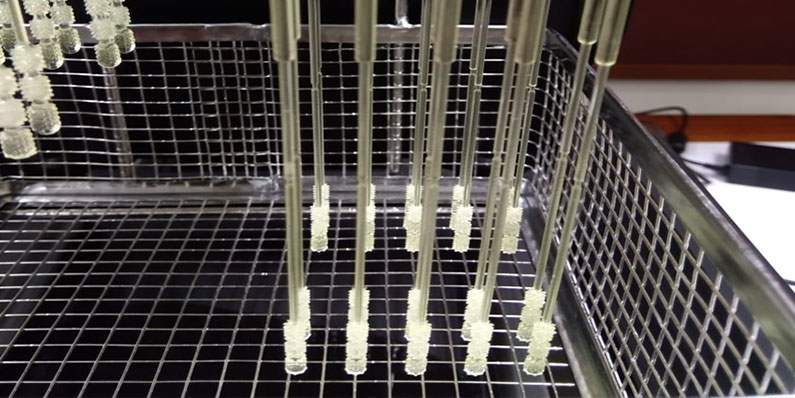Pakistan now has the ability to locally produce nasal swabs, the essential tool that collects samples for COVID-19 tests, after Aga Khan University successfully completed clinical trials on a 3D printed swab.
The COVID-19 pandemic has led to a global surge in demand for diagnostic test kits and components, including the cotton bud-shaped nasal swabs, as countries around the world ramped up testing facilities. Pakistan was no different and has had to import all nasal swabs to date.
Supply constraints at the peak of the pandemic in April to May 2020 led to AKU’s Innovation Lab searching for a solution by designing and developing a local alternative.
A team of researchers, clinical laboratory experts and biomedical engineers, led by Saleem Sayani, principal investigator and director of AKU’s Technology and Innovation Centre and Digital Health Resource Centre, used a specialised 3D printer to develop a prototype. Clinical trials on the prototype have now found the 3D printed nasal swab to be as safe, effective and user-friendly as imported swabs.

“Our printer can produce over 1,000 swabs per day at a significantly lower cost than those we import,” said Mr Sayani.
AKU Medical College Dean Dr Adil Haider stated that the 3D printed swab demonstrated how local innovation can solve local problems even in the midst of a pandemic.
“The 3D printed swab will reduce the need to import swabs for respiratory sampling,” said Professor Zahra Hasan from AKU’s department of pathology and laboratory medicine, the co-principal investigator on the project. “This can help increase COVID-19 diagnostic capacity across Pakistan.
The Aga Khan University -Research Centers
The Centre for Regenerative Medicine and Stem Cell Research (CRM) houses international researchers conducting state of the art research and teaching in basic and translational stem cell science. The recruitment of faculty and research program is undertaken in collaboration with the Eli and Edythe Broad Center of Regeneration Medicine and Stem Cell Research at the University of California, San Francisco.
The Centre of Excellence in Women and Child Health represents flagship research programs on reproductive, maternal, newborn and child health (RMNCH). The Centre is well-placed to potentially address priority research issues of relevance to women and children in developing countries, with a large existing portfolio of work related to infectious diseases, perinatal health and outcomes, maternal and child nutrition, and early childhood development.
- Brain and Mind Institute
The Brain and Mind Institute is a new initiative that complements and fuels AKU’s faculty expertise, clinical infrastructure, and academic programs in mental health and neuroscience. The Institute is prioritizing coordinated action to improve health and wellbeing by reducing the damaging advance of mental illness on sustainable socioeconomic development. The foundational pillars of the Institute’s work program are: (1) Education and Training; (2) Research; (3) Innovation and Knowledge Translation; and (4) Engagement and Partnerships.
- Institute for Global Health and Development
The Institute for Global Health and Development is a new initiative that operates across the university’s multi-country campuses, connecting a variety of academic entities, and facilitating interdisciplinary research, education and related programming. The Institute’s work program involves several thematic areas: (1) Climate Change, Urban Development and Health; (2) Gender, Equity and Empowerment; (3) Agriculture, Food Security and Nutrition; and (4) the Sustainable Development Goals.
